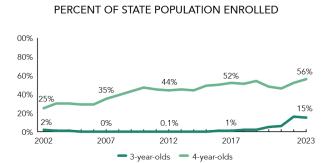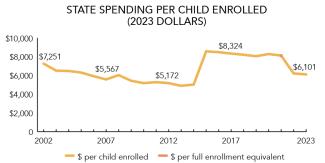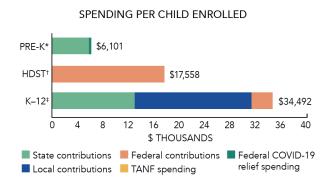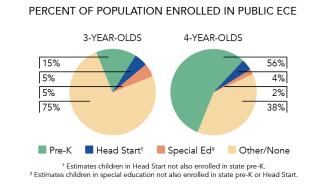
State of Preschool
New York
Access Rankings
Resource Rankings
Total Benchmarks Met
Overview

During the 2022-2023 school year New York preschool enrolled 155,512 children, an increase of 3,524 from the prior year. State spending totaled $884,375,996, with an additional $64,396,595 in federal recovery funds to support the program, up $5,745,842 (1%), adjusted for inflation, since last year. State spending per child (including federal recovery funds) equaled $6,101 in 2022-2023, down $104 from 2021-2022, adjusted for inflation. New York met 7 of 10 quality standards benchmarks.
What's New

In 2022-2023, $25 million in competitive Statewide Universal Full-Day Prekindergarten Program (SUFDPK) grants were awarded to 57 school districts for preschool expansion. Additionally, the Fiscal Year 2024 enacted state budget included an additional $100 million for the Universal Prekindergarten Program (UPK) and $50 million for a new competitive SUFDPK grant. The Office of Early Learning’s capacity increased so more site visits and professional learning opportunities were provided. New York State is also updating preschool regulations to better support the needs of emergent multilingual learners. The New York Office of Children and Family Services received a Preschool Development Grant Birth through Five (PDG B–5) planning grant in December 2022 for $4 million.
Background
In 1998, New York State began its Universal Prekindergarten Program (UPK) with the goal of making prekindergarten education available to all 4-year-olds in the state, regardless of family income or other risk factors. In 2007, the Targeted Prekindergarten Program merged with UPK. In the 2013-2014 school year, the state continued targeting its pre-K funding, launching the New York State Priority Prekindergarten Program (NYSPPK) offering competitive grants creating new full- and half-day slots for high-need children in low-income school districts and enabling districts to convert half-day slots to full-day. In 2014-2015, the Statewide Universal Full-Day Prekindergarten Program (SUFDPK) competitive grant for full-day pre-K was launched. Most of this funding ($300 million) went to New York City, resulting in a dramatic boost in access to full-day pre-K slots for 4-year-olds; $40 million was used to expand full-day programs in the rest of the state. Funding could be used to create additional full-day placements or to convert existing half-day slots to full-day.
In 2015-2016, the Expanded Prekindergarten for 3- and 4-Year-Old Students grant began, creating new slots for both 3- and 4-year-olds. New York also was awarded a 2014 federal Preschool Development Grant (PDG) supporting enrollment of additional low-income 4-year-olds in five school districts. Ninety percent of children were served in full-day programs in 2022-2023.
The New York Board of Regents adopted revised comprehensive, multi-domain early learning standards in 2011 which are aligned with state K–3 standards, state college and career ready standards, and the New York State Common Core Learning Standards. In 2012, the state implemented a voluntary quality rating and improvement system (QRIS) called QUALITYstarsNY.
In 2017-2018, all districts receiving state funds for pre-K were required to adopt approved quality indicators within two years, including, but not limited to, valid and reliable measures of environmental quality, the quality of teacher-student interactions, and child outcomes. To document districts’ progress in implementing the approved quality indicators, the State Education Department (SED) implemented the NYS Pre-K Self-Assessment. Districts rate themselves as Implemented, In Process, or Not Implemented. For each area marked In Process or Not Implemented, districts develop Quality Improvement Action Plans to assess strengths and weakness in seven areas of program quality. SED staff review the plans and provide feedback to inform technical assistance and monitoring.
New York State Administered Prekindergarten Program
Access
Resources
| Total state pre-K spending | $948,772,591 |
| Local match required? | No |
| State Head Start spending | $0 |
| State spending per child enrolled | $6,101 |
| All reported spending per child enrolled* | $6,101 |

*Pre-K programs may receive additional funds from federal or local sources that are not included in this figure. †Head Start per-child spending includes funding only for 3- and 4-year-olds. ‡K–12 expenditures include capital spending as well as current operating expenditures.
New York Quality Standards Checklist
| Policy | Requirement | Benchmark | Meets Benchmark? |
|---|---|---|---|
For more information about the benchmarks, see the Executive Summary and the Roadmap to State pages. | 7benchmarks met | ||
| Early Learning & Development Standards Benchmark | Comprehensive, aligned, supported, culturally sensitive | Comprehensive, aligned, supported, culturally sensitive | |
| Curriculum Supports Benchmark | Approval process & supports | Approval process & supports | |
| Teacher Degree Benchmark | BA* | BA | |
| Teacher Specialized Training Benchmark | ECE | Specializing in pre-K | |
| Assistant Teacher Degree Benchmark | Level I Teaching Assistant Certificate (public); HSD (nonpublic) | CDA or equivalent | |
| Staff Professional Development Benchmark | 175 hours/5 years (teachers only); Coaching (first year public school teachers only) | For teachers & assistants: At least 15 hours/year; individual PD plans; coaching | |
| Maximum Class Size Benchmark | 20 (3- & 4-year-olds) | 20 or lower | |
| Staff to Child Ratio Benchmark | 1:9 (3- & 4-year-olds) | 1:10 or better | |
| Screening & Referral Benchmark | Vision, hearing, health & more | Vision, hearing & health screenings; & referral | |
| Continuous Quality Improvement System Benchmark | Annual structured classroom observations; Data used at the local level only (UPK); Determined locally (SUFDPK) | Structured classroom observations; data used for program improvement | |
